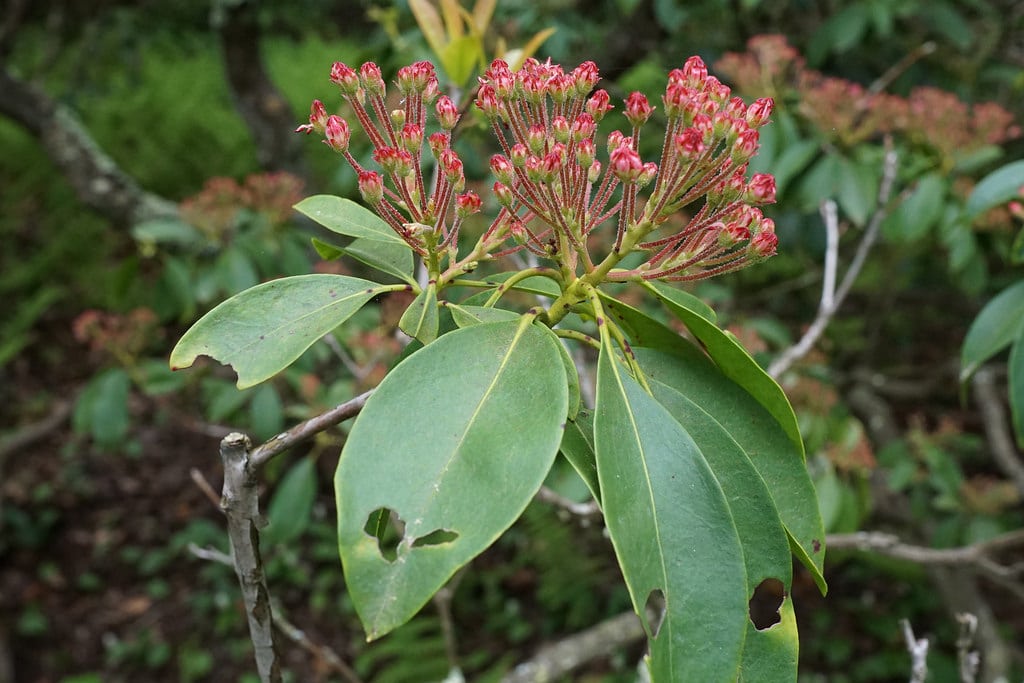Mountain Laurel Problems: What To Do With An Unhealthy Mountain Laurel


Sign up for the Gardening Know How newsletter today and receive a free copy of our e-book "How to Grow Delicious Tomatoes".
You are now subscribed
Your newsletter sign-up was successful
Mountain laurel (Kalmia latifolia) is a showy ornamental shrub that is hardy to USDA zones 5 through 9. In the spring and early summer, mature plants put on a dazzling display of small clustered flowers. While their beautiful blooms and evergreen foliage attract the attention of many landscapers, they are also prized for their wide adaptability, growing well in both shade and sun. Though these plants are generally trouble-free, there are some issues which may cause plant vigor to suffer when growing mountain laurel. What’s wrong with my mountain laurel, you ask? Find out about common problems with mountain laurels here and how to fix them.
About Mountain Laurel Problems
Issues with mountain laurel plants may occur for a wide variety of reasons. Whether injury has been caused due to weather, fungal infections, or bacterial issues, it is important to be able to quickly identify the problem and determine the best course of treatment for plants. While some causes of mountain laurel problems may be incidental, others may progress and spread to other laurels within the garden without intervention from the gardener. Below are some of the more common mountain laurel issues you might come across when growing these shrubs in the landscape.
Weather Damage
Some of the most common problems with mountain laurel results from damage done during inclement weather. Since this shrub is an evergreen and maintains foliage throughout the winter, it is susceptible to damage done by cold temperatures. This most often occurs in gardens located in the coldest region of its hardiness zone. Gardeners living in areas which experience heavy snow and windy winter conditions may also notice broken branches and evidence of browning leaves. To maintain these plants, be sure to remove any dead limbs and dispose of them. Removal of plant materials from the garden is an important step in preventing disease, as many organisms may live and overwinter on dead wood. Plants should recover in the spring as new growth resumes. Mountain laurel bushes are also sensitive to drought. Signs of damage incurred by dry conditions include drooping leaves, browning of the leaves, and sometimes cracked stems. Drought-stressed plants are often more susceptible to other pathogens as well. Be sure to water mountain laurels deeply, at least once a week, throughout the active growing season.
Unhealthy Mountain Laurel Leaves
One of the first signs gardeners may notice about unhealthy mountain laurel plants is the change in appearance of the leaves. These shrubs can be affected by numerous forms of fungal infections as well as blight. As the name implies, leaf spot is recognizable by the presence of dark “spots” on the leaves. Infected leaves most often fall from the plant. These should be removed from the garden, as this waste can promote further spread of the issue. With proper garden maintenance and clean-up, it is rare that issues with leaf spot become a serious problem.
Sign up for the Gardening Know How newsletter today and receive a free copy of our e-book "How to Grow Delicious Tomatoes".

Tonya Barnett has been gardening for 13 years. Flowers are her passion. She has transformed her backyard into a cut flower garden, which she regularly chronicles on her YouTube channel http://www.youtube.com/@tonyawiththeflowers.